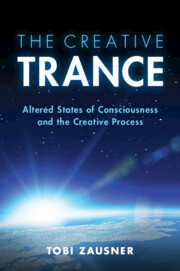Book contents
- The Creative Trance
- The Creative Trance
- Copyright page
- Dedication
- Contents
- Acknowledgments
- Introduction The Pervasive State of Trance
- Chapter 1 The Multifaceted Creative Trance
- Chapter 2 Consciousness and Creativity Theory in the Creative Trance
- Chapter 3 Unconscious Origins of the Creative Trance
- Chapter 4 Empathy and Dissociation in the Creative Trance
- Chapter 5 Evolution, Altered States, and the Creative Trance
- Chapter 6 The Creative Trance and the Brain
- Chapter 7 Dynamics of the Creative Trance
- Chapter 8 Dyslexia, Attention-Deficit Disorder, and the Creative Trance
- Chapter 9 Illness and Transformation in the Creative Trance
- Chapter 10 Different Abilities and the Creative Trance
- Chapter 11 Dementia and the Creative Trance
- Chapter 12 Altered States of a Lifesaving Creative Trance
- References
- Index
Chapter 11 - Dementia and the Creative Trance
Published online by Cambridge University Press: 02 June 2022
- The Creative Trance
- The Creative Trance
- Copyright page
- Dedication
- Contents
- Acknowledgments
- Introduction The Pervasive State of Trance
- Chapter 1 The Multifaceted Creative Trance
- Chapter 2 Consciousness and Creativity Theory in the Creative Trance
- Chapter 3 Unconscious Origins of the Creative Trance
- Chapter 4 Empathy and Dissociation in the Creative Trance
- Chapter 5 Evolution, Altered States, and the Creative Trance
- Chapter 6 The Creative Trance and the Brain
- Chapter 7 Dynamics of the Creative Trance
- Chapter 8 Dyslexia, Attention-Deficit Disorder, and the Creative Trance
- Chapter 9 Illness and Transformation in the Creative Trance
- Chapter 10 Different Abilities and the Creative Trance
- Chapter 11 Dementia and the Creative Trance
- Chapter 12 Altered States of a Lifesaving Creative Trance
- References
- Index
Summary
Worldwide, we are an aging population, with dementia affecting people in increasing numbers. Here we focus on two types of dementia: Alzheimer's disease because it is the most prevalent form of dementia and the primary progressive aphasia of frontotemporal dementia because of its capacity to enhance creativity in music and visual art. For individuals with progressive dementia, the creative trance is an oasis, a world apart from the daily world of their growing difficulties. Instead, they face the solvable problems of creativity. Iris Murdoch wrote her final novel, Jackson's Dilemma, during the early stages of Alzheimer’s disease, and Willem de Kooning focused on painting as his dementia advanced. Sometimes, dementia can influence work for the better, even if only for a brief time. Frontotemporal dementia gave power to Maurice Ravel’s best-known work, Bolero, and Anne Theresa Adams, who also had frontotemporal dementia, resonated with the music, and transcribed it into visual art.
Keywords
- Type
- Chapter
- Information
- The Creative TranceAltered States of Consciousness and the Creative Process, pp. 161 - 173Publisher: Cambridge University PressPrint publication year: 2022

